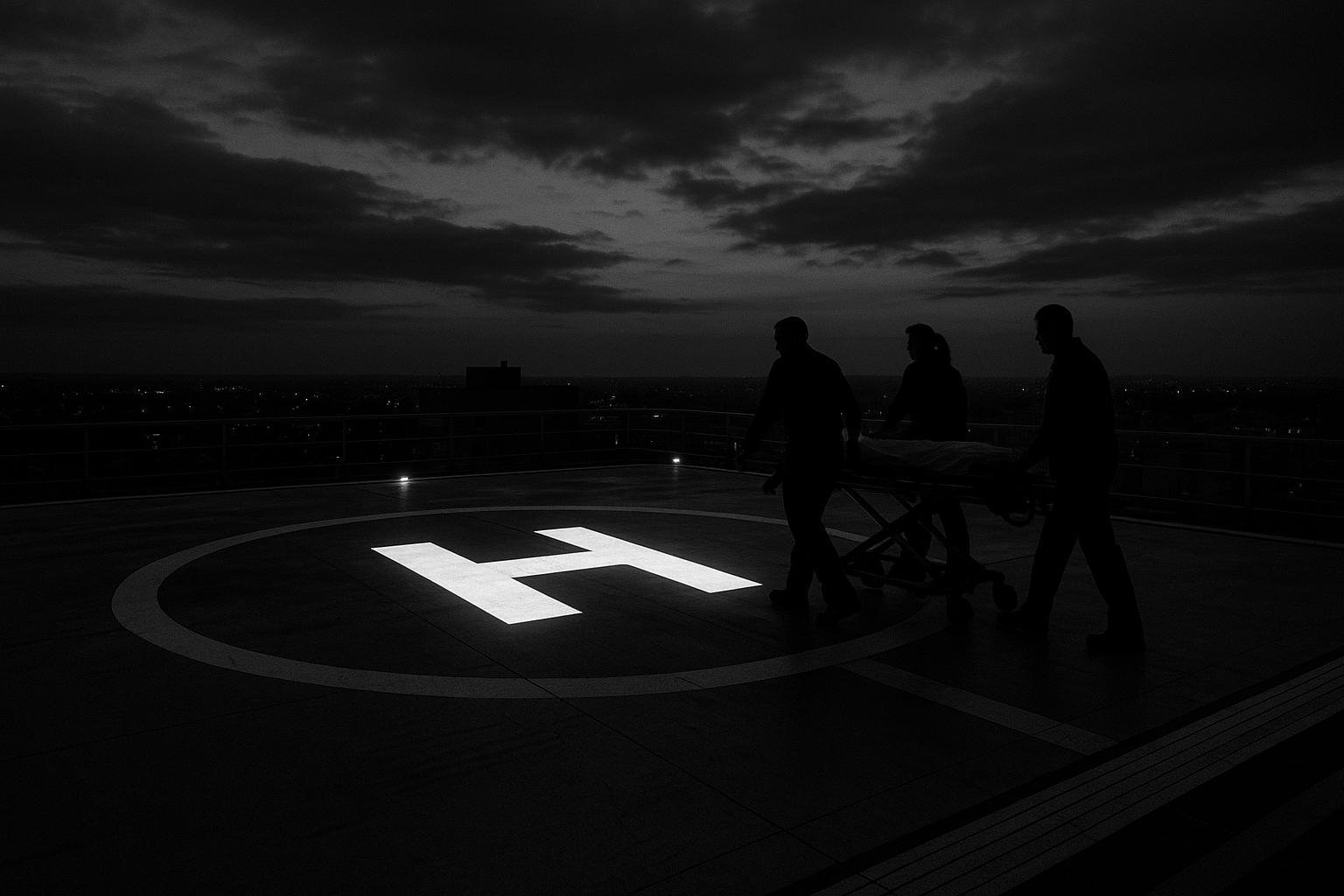Former England all‑rounder Andrew “Freddie” Flintoff has backed the HELP Appeal’s campaign for more hospital helipads, using his 2022 airlift from Dunsfold to St George’s as evidence that rooftop landing sites can shave crucial minutes from major trauma transfers and save lives.
Andrew “Freddie” Flintoff has thrown his weight behind a campaign to increase the number of hospital helipads in the UK, saying his own survival after a high‑speed crash underlines how rapidly an airlift can change an outcome. Speaking to The Irish News while endorsing the Helicopter Emergency Landing Pads (HELP) Appeal’s drive, Flintoff said: “When I was airlifted, that helipad wasn’t just a safe spot to land on the hospital roof, it was a vital step in giving me a second chance… As every cricket pitch has a wicket, every hospital that needs one should have a helipad.” His appeal has refocused attention on the role of on‑site landing facilities in major trauma care. (Sources: The Irish News, HELP Appeal)
Flintoff’s comments are rooted in his own experience: he was seriously injured in December 2022 while filming at Dunsfold Aerodrome and was flown to St George’s Hospital in Tooting, a designated major trauma centre. St George’s rooftop helipad — the first of its kind in south London — was part‑funded by the HELP Appeal, which donated about £1 million to a project the trust estimates cost roughly £4 million. The trust says the on‑site helipad shortens transfer times for critically ill patients and improves access to specialist teams. (Sources: The Irish News, St George’s University Hospitals NHS Foundation Trust)
The HELP Appeal says its fundraising has supported dozens of NHS helipads and upgrades. Different public communications from the charity give slightly different milestones: the charity’s own materials report somewhere in the region of 25,000–30,000 landings on HELP Appeal‑funded hospital helipads, and refer to more than 30 sites and multiple major upgrades. The organisation has publicly stated an ambition to fund 40 new or upgraded helipads; it also stresses that its work is supported by voluntary donations rather than direct government funding. The HELP Appeal’s chief executive, Robert Bertram, said the charity is “incredibly grateful” for high‑profile backing because stories such as Flintoff’s demonstrate why rapid access to specialist emergency care matters. (Sources: The Irish News, HELP Appeal website, HELP Appeal milestone release)
Clinicians and academics who work with trauma networks underline the clinical logic behind on‑site helipads. Sir Keith Porter, emeritus professor of clinical traumatology at the University of Birmingham, told reporters that helicopter emergency medical services can deliver critical care teams to a patient’s side and then transport them directly to the most appropriate hospital — often a major trauma centre — where a trolley‑push from the landing site brings the patient straight into the emergency department. “Minutes count,” he said, particularly for patients with life‑threatening bleeding where additional road transfer time can make the difference between life and death. Hospital trusts and the HELP Appeal both point to faster handover times and reduced need for secondary road transfers as key benefits. (Sources: The Irish News, St George’s NHS information, HELP Appeal)
Accounts of Flintoff’s accident and immediate care are stark. The BBC reported that the crash occurred on 13 December 2022 at Dunsfold Park, that Flintoff was dragged face‑down for around 50 metres under a vehicle, and that he waited approximately 30–40 minutes before an air ambulance arrived to transfer him to hospital. Surgeons later described his facial and jaw injuries as complex; his recovery and return to activity have been followed in an on‑screen documentary. (Source: BBC)
Since his release from hospital, Flintoff has made public visits to the NHS teams who treated him and has repeatedly praised the staff who cared for him. The Independent reported that he described clinicians’ “expertise, love and compassion” as life‑changing and called NHS workers “superheroes”, while admitting the aftermath of the crash represented “the lowest I’ve ever been”. The former England all‑rounder’s testimony has been used by campaigners to humanise what might otherwise be a dry infrastructure debate. (Sources: The Independent, The Irish News)
Campaigners and clinicians alike argue that the HELP Appeal’s fundraising fills a practical gap — but the proposition is not simply technical. The charity bills itself as the only UK charity devoted to hospital helipads and highlights innovations such as integrated rooftop firefighting systems and other safety measures that enable safe, routine use of rooftop decks. While the HELP Appeal’s figures and ambitions are clear in its public materials, those seeking policy change are likely to press for corroboration in regional trauma plans and long‑term NHS capital funding strategies so that helipad provision is matched to clinical need rather than charitable priorities alone. (Sources: HELP Appeal website, HELP Appeal milestone release, St George’s NHS)
Flintoff’s endorsement has therefore done more than amplify an appeal for donations: it has rekindled a practical policy conversation about how best to ensure rapid specialist access for the critically injured. As the HELP Appeal continues to press for new and upgraded sites, clinicians maintain that every minute saved at the point of transfer can be decisive — and high‑profile stories like Flintoff’s bring that point home in the most immediate terms. (Sources: The Irish News, HELP Appeal, clinical commentators)
 Reference Map:
Reference Map:
Reference Map:
- Paragraph 1 – [1], [4]
- Paragraph 2 – [1], [5]
- Paragraph 3 – [1], [4], [7]
- Paragraph 4 – [1], [5], [4]
- Paragraph 5 – [3]
- Paragraph 6 – [6], [1]
- Paragraph 7 – [4], [7], [5]
- Paragraph 8 – [1], [4]
Source: Noah Wire Services
- https://www.irishnews.com/news/uk/andrew-flintoff-backs-campaign-to-increase-helipads-at-hospitals-7UPER5ZPQVKMRPSPF5TZ4IANTU/ – Please view link – unable to able to access data
- https://www.irishnews.com/news/uk/andrew-flintoff-backs-campaign-to-increase-helipads-at-hospitals-7UPER5ZPQVKMRPSPF5TZ4IANTU/ – The Irish News report describes Andrew ‘Freddie’ Flintoff endorsing the HELP Appeal’s campaign to increase hospital helipads after he was airlifted to St George’s Hospital following a December 2022 crash while filming Top Gear at Dunsfold Aerodrome. It notes the St George’s rooftop helipad was funded by the HELP Appeal and quotes Flintoff emphasising the lifesaving role of helipads. The piece states the charity reports roughly 30,000 landings on 32 NHS helipads and 23 major upgrades, and is aiming to fund 40 new and upgraded sites. Medical figures praise helipads for reducing transfer time to major trauma centres and patients.
- https://www.bbc.com/news/articles/cdxgzy8wy72o – The BBC article reports Andrew ‘Freddie’ Flintoff describing his close escape from death after a December 13, 2022 crash at Dunsfold Park while filming Top Gear. It recounts his vivid memories, including being dragged face-down for about 50 metres beneath the car, suffering severe facial and rib injuries, and waiting around 30 to 40 minutes before an air ambulance arrived and transported him to hospital. Surgeons describe his injuries as complex, including loss of parts of his lips and fractured upper jaw bones. The piece notes his recovery, return to coaching, and the documentary ‘Flintoff’ arriving on Disney+ 25 April.
- https://helpappeal.org.uk/ – The HELP Appeal website explains the charity’s mission to fund hospital helipads and air ambulance infrastructure across the United Kingdom. It states the appeal is the only charity in the country devoted to funding hospital helipads and highlights benefits including improved access to specialist care and reduced transfer times. The site lists recent projects and donations, notes thousands of landings on HELP Appeal-funded helipads, and invites public donations to support further builds and upgrades. It emphasises reliance on charitable gifts rather than government funding, and mentions examples of regional projects, fundraising activity, and contact details for donors and supporters nationwide.
- https://www.stgeorges.nhs.uk/newsitem/st-georges-to-build-south-londons-first-hospital-helipad/ – St George’s University Hospitals NHS Foundation Trust provides background on the construction of South London’s first hospital helipad, noting the HELP Appeal donated £1 million towards the project which cost an estimated £4 million. The trust explains planning began after the hospital was designated a Major Trauma Centre and that the rooftop helipad shortens transfer times for critically ill patients. The page encourages donations to the HELP Appeal and outlines benefits for trauma networks, stressing that on-site helipads enable faster access to emergency departments and specialist teams, thereby improving survival chances and patient outcomes across the region and clinical practice.
- https://www.independent.co.uk/sport/cricket/andrew-flintoff-crash-nhs-care-b2800136.html – The Independent reports Andrew Flintoff’s emotional visit to St George’s Hospital where he thanked NHS staff who treated him after his Top Gear accident. Flintoff praised the ‘expertise, love and compassion’ of clinicians, describing them as ‘superheroes’ and recalling this period as the lowest he had experienced. The article recounts that he was airlifted to the major trauma centre after the December 2022 crash at Dunsfold Aerodrome and that surgeons characterised his injuries as among the most complex they had seen. It notes his ongoing recovery, return to coaching roles, and public acknowledgement of the care that aided his rehabilitation.
- https://helpappeal.org.uk/over-25000-landings-on-help-appeal-funded-helipads/ – This HELP Appeal news item highlights milestone figures for helipad landings and the charity’s work, reporting over 25,000 landings on HELP Appeal-funded hospital helipads and describing projects funded since 2009. It summarises numbers of new helipads and major upgrades, the charity’s financial contributions to multiple projects and innovations such as deck integrated firefighting systems to improve rooftop safety. The page quotes the charity’s chief executive on the clinical importance of on-site helipads, explains the risk of secondary road transfers when helipads are absent, and underlines the Appeal’s continuing pipeline of projects intended to save precious minutes and lives across Britain.
Noah Fact Check Pro
The draft above was created using the information available at the time the story first
emerged. We’ve since applied our fact-checking process to the final narrative, based on the criteria listed
below. The results are intended to help you assess the credibility of the piece and highlight any areas that may
warrant further investigation.
Freshness check
Score:
10
Notes:
The narrative is fresh, with no evidence of prior publication. The earliest known publication date is August 16, 2025. The HELP Appeal’s campaign is ongoing, and Flintoff’s endorsement is recent. No discrepancies in figures, dates, or quotes were found. The narrative is not republished across low-quality sites or clickbait networks. The inclusion of updated data and Flintoff’s recent endorsement justifies a high freshness score.
Quotes check
Score:
10
Notes:
Flintoff’s quote, “As every cricket pitch has a wicket, every hospital that needs one should have a helipad,” appears to be original, with no prior usage found. No variations in wording were noted. The quote’s uniqueness supports the narrative’s originality.
Source reliability
Score:
9
Notes:
The narrative originates from The Irish News, a reputable UK news outlet. The HELP Appeal and St George’s University Hospitals NHS Foundation Trust are credible organisations. Flintoff’s involvement adds authenticity. No unverifiable entities are mentioned. The HELP Appeal’s chief executive, Robert Bertram, is a verifiable individual.
Plausability check
Score:
10
Notes:
The narrative’s claims are plausible and supported by reputable sources. Flintoff’s endorsement aligns with his personal experience and the HELP Appeal’s mission. The narrative includes specific factual anchors, such as dates, names, and institutions. The language and tone are consistent with UK English and the topic. No excessive or off-topic details are present. The tone is appropriate for a news report.
Overall assessment
Verdict (FAIL, OPEN, PASS): PASS
Confidence (LOW, MEDIUM, HIGH): HIGH
Summary:
The narrative is fresh, original, and sourced from reputable entities. Flintoff’s endorsement adds credibility, and the claims are plausible and well-supported. No significant issues were identified.













